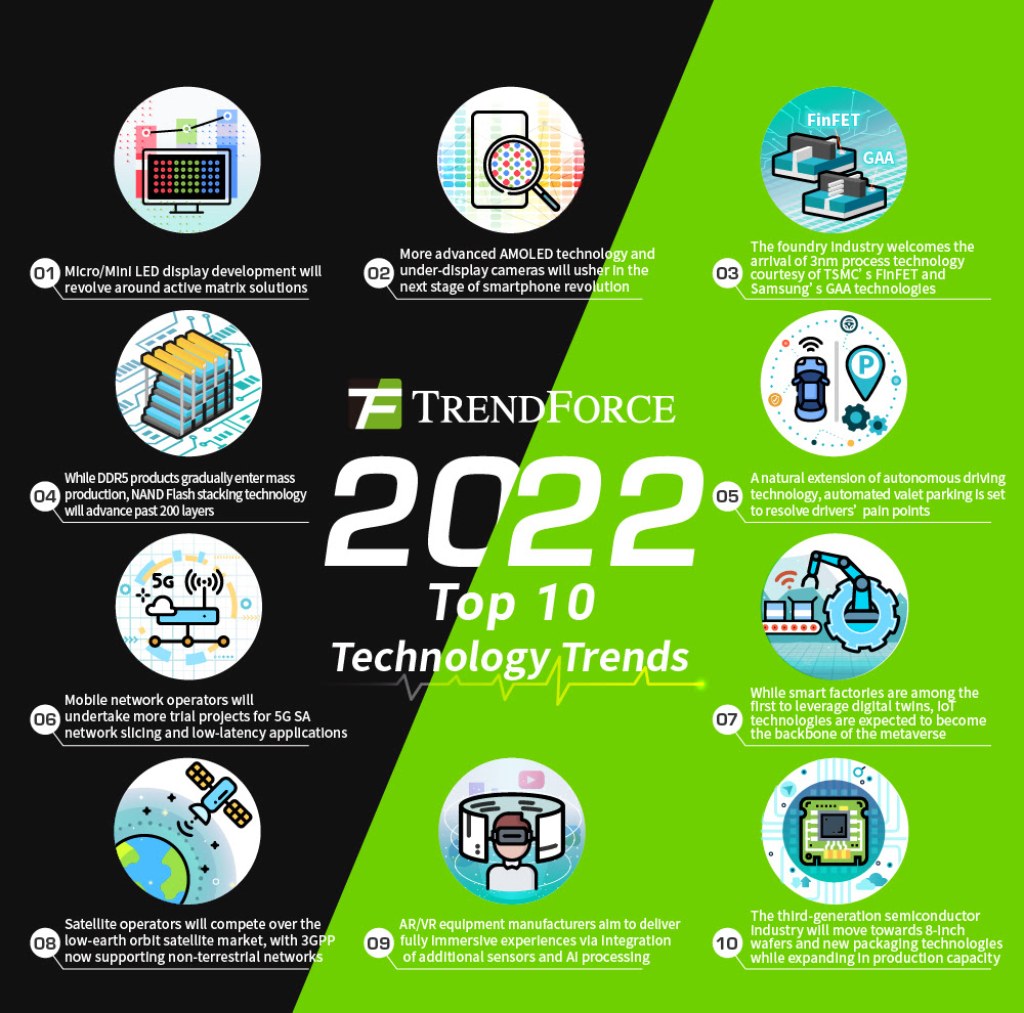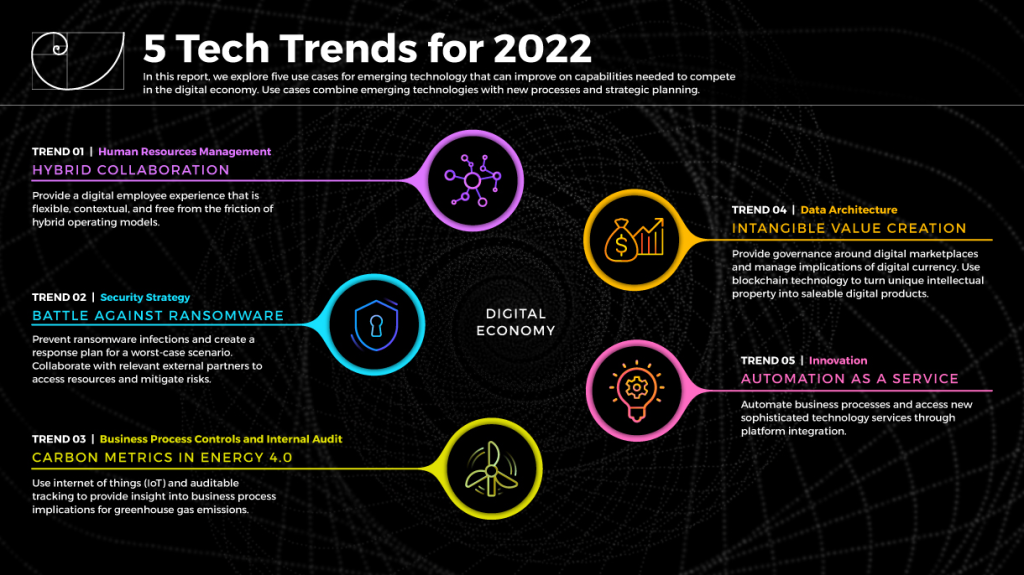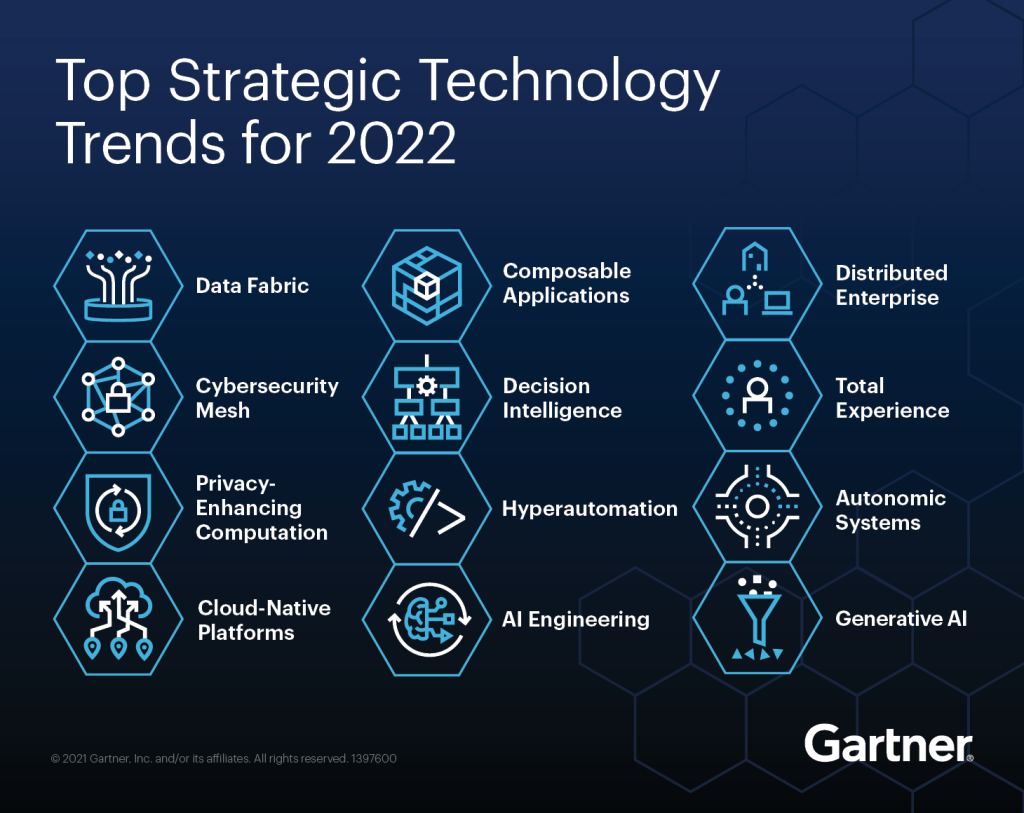Unveiling The Spectacular New Technology Trends 2022: Get Ready To Be Amazed And Take Action!
New Technology Trends 2022
Introduction
Hello Readers,
3 Picture Gallery: Unveiling The Spectacular New Technology Trends 2022: Get Ready To Be Amazed And Take Action!



Welcome to our article on the new technology trends for 2022. In this fast-paced digital age, staying updated with the latest advancements is vital for individuals and businesses alike. The year 2022 promises to bring forth exciting innovations and trends that have the potential to shape our future. In this article, we will explore the top technology trends that are expected to dominate the industry in the coming year. So, let’s dive in and discover the incredible possibilities that lie ahead!
Table of Contents
Artificial Intelligence (AI) and Machine Learning (ML) 🤓
Internet of Things (IoT) 🛰
5G Technology 🚀
Blockchain 📈
Virtual Reality (VR) and Augmented Reality (AR) 🎨
Cybersecurity 🔒
Quantum Computing 💻
Robotics and Automation 🤖
Edge Computing 🛠
Biotechnology 🧪
Renewable Energy Technologies 💧
Smart Cities 🌆

Image Source: googleusercontent.com
1. Artificial Intelligence (AI) and Machine Learning (ML) 🤓
Artificial Intelligence and Machine Learning are rapidly evolving technologies that continue to transform various industries. AI-powered systems and ML algorithms enable computers to perform tasks that traditionally required human intelligence. In 2022, we can expect AI and ML to become more sophisticated, enabling businesses to automate processes, improve decision-making, and enhance customer experiences. From chatbots and virtual assistants to predictive analytics and autonomous vehicles, AI and ML will revolutionize the way we live and work.
What is Artificial Intelligence (AI)?
Artificial Intelligence refers to the simulation of human intelligence in machines that are programmed to think and learn like humans. It involves the development of computer systems capable of performing tasks that typically require human intelligence, such as speech recognition, problem-solving, and decision-making.
Who is Using Artificial Intelligence (AI)?

Image Source: infotech.com
Various industries are leveraging AI to streamline operations and improve efficiency. Companies like Google, Amazon, and Facebook are using AI to personalize user experiences, while healthcare organizations are utilizing AI to develop advanced diagnostics and treatment plans. Additionally, industries such as finance, manufacturing, and transportation are adopting AI to optimize processes and drive innovation.
When Will Artificial Intelligence (AI) Dominate?
Artificial Intelligence is already making significant strides and is expected to continue its rapid growth in the coming years. As technology advancements continue and more data becomes available, AI is likely to dominate various sectors, including healthcare, finance, customer service, and transportation.
Where is Artificial Intelligence (AI) Being Applied?

Image Source: gcom.cloud
Artificial Intelligence finds applications in numerous fields, including healthcare, finance, retail, manufacturing, and entertainment. It is being used to improve diagnosis and treatment in healthcare, automate financial processes, enhance customer experiences through personalized recommendations, optimize supply chains, and create immersive virtual experiences in the entertainment industry.
Why is Artificial Intelligence (AI) Important?
Artificial Intelligence has the potential to revolutionize industries and improve human lives in numerous ways. It can automate repetitive tasks, improve efficiency and accuracy, enable better decision-making, and create new opportunities for innovation. AI also has the potential to address complex societal challenges, such as climate change and healthcare, by analyzing vast amounts of data and providing valuable insights.
How is Artificial Intelligence (AI) Advancing?
Advancements in AI are driven by research and development efforts, increased computing power, and the availability of massive amounts of data. Machine Learning algorithms are becoming more complex and efficient, enabling computers to learn from data and improve performance over time. Additionally, advancements in Natural Language Processing and Computer Vision are making AI systems more capable of understanding and interacting with humans.
2. Internet of Things (IoT) 🛰
The Internet of Things (IoT) refers to the network of interconnected devices embedded with sensors, software, and other technologies that enable them to collect and exchange data. IoT is revolutionizing various industries by enabling the seamless integration of physical and digital systems. In 2022, we can expect IoT to continue expanding its reach, connecting more devices and enabling smarter and more efficient processes.
What is the Internet of Things (IoT)?
The Internet of Things (IoT) is a system of interrelated devices, objects, or machines that have unique identifiers and can communicate and exchange data over a network. These devices can range from everyday objects like smartphones and wearable devices to industrial equipment and smart home appliances.
Who is Using the Internet of Things (IoT)?
Various industries, including healthcare, agriculture, transportation, and manufacturing, are adopting IoT to improve efficiency, reduce costs, and enhance productivity. For example, in healthcare, IoT devices can monitor patients’ vital signs and send real-time data to healthcare providers, enabling remote monitoring and timely interventions.
When Will the Internet of Things (IoT) be Ubiquitous?
The Internet of Things is already becoming increasingly prevalent in our daily lives. With the advancement of technology and the increasing availability of affordable IoT devices, it is expected that IoT will continue to expand its presence and become ubiquitous in the near future.
Where is the Internet of Things (IoT) Being Applied?
The Internet of Things is being applied in various domains, including smart cities, agriculture, healthcare, transportation, and manufacturing. In smart cities, IoT is used to optimize energy consumption, manage traffic flow, and enhance public safety. In agriculture, IoT devices enable farmers to monitor soil moisture, temperature, and other environmental factors to optimize crop yields.
Why is the Internet of Things (IoT) Important?
The Internet of Things has the potential to revolutionize industries and improve efficiency and quality of life. By connecting devices and enabling data exchange, IoT can automate processes, optimize resource utilization, and provide valuable insights for decision-making. It also has the potential to create new business models and drive innovation.
How is the Internet of Things (IoT) Advancing?
The advancement of the Internet of Things is driven by technological innovations in areas such as connectivity, sensor technologies, and data analytics. With the increasing availability of low-cost sensors and the development of advanced communication protocols, more devices can be connected to the IoT network. Additionally, advancements in data analytics and machine learning enable the extraction of valuable insights from the vast amount of data generated by IoT devices.
3. 5G Technology 🚀
5G technology is the fifth generation of wireless technology that promises faster speeds, lower latency, and greater capacity compared to its predecessors. It holds immense potential for revolutionizing industries and enabling new applications that require high-speed connectivity and real-time communication. In 2022, we can expect the deployment of 5G networks to accelerate, unlocking new opportunities for businesses and consumers.
What is 5G Technology?
5G technology is the next generation of wireless communication technology that provides faster speeds, lower latency, and greater capacity compared to previous generations. It uses higher frequency bands and advanced antenna technologies to deliver ultra-fast and reliable wireless connectivity.
Who is Using 5G Technology?
Various industries, including telecommunications, manufacturing, healthcare, and transportation, are utilizing 5G technology to enable innovative applications and improve operational efficiency. Telecom companies are deploying 5G networks to offer high-speed internet connectivity to consumers, while industries are leveraging 5G for applications such as remote monitoring, autonomous vehicles, and smart factories.
When Will 5G Technology be Widely Available?
5G technology is already being rolled out in several countries, and its availability is expected to increase significantly in the coming years. As infrastructure development progresses and more devices become 5G-compatible, the technology will become widely available to consumers and businesses.
Where is 5G Technology Being Deployed?
5G technology is being deployed in various countries around the world, with major cities and urban areas being the initial focus. Telecom companies are expanding their 5G infrastructure to provide high-speed connectivity in densely populated areas, enabling faster internet speeds and supporting new applications.
Why is 5G Technology Important?
5G technology is important because it enables faster and more reliable wireless communication, unlocking new possibilities for businesses and consumers. It can support emerging technologies such as autonomous vehicles, virtual reality, and telemedicine, which require fast and low-latency connections. 5G also has the potential to drive digital transformation across industries, enabling innovative business models and enhancing productivity.
How is 5G Technology Advancing?
Advancements in 5G technology are driven by ongoing research and development efforts, collaboration among industry stakeholders, and the deployment of infrastructure. As technology evolves, we can expect improvements in network speeds, coverage, and reliability. Additionally, the development of new use cases and applications will further drive the advancement of 5G technology.
4. Blockchain 📈
Blockchain technology, originally designed for cryptocurrencies like Bitcoin, has evolved into a versatile technology with applications across various industries. It enables secure and transparent transactions, eliminates intermediaries, and ensures the integrity of data. In 2022, we can expect blockchain to continue gaining traction, revolutionizing industries such as finance, supply chain, and healthcare.
What is Blockchain Technology?
Blockchain technology is a decentralized and distributed ledger that records transactions across multiple computers. Each transaction, or block, contains a cryptographic hash of the previous block, creating a chain of blocks. This technology ensures transparency, security, and immutability of transactions.
Who is Using Blockchain Technology?
Blockchain technology is being adopted by various industries, including finance, supply chain, healthcare, and energy. Financial institutions are exploring the use of blockchain for secure and efficient transactions, while supply chain companies are implementing blockchain to enhance transparency and traceability. Additionally, blockchain has the potential to revolutionize healthcare by securely managing patient data and facilitating interoperability.
When Will Blockchain Technology be Widely Adopted?
Blockchain technology is already being implemented in various industries, and its adoption is expected to increase in the coming years. As organizations recognize the potential of blockchain for improving efficiency, reducing costs, and enhancing security, we can expect widespread adoption across sectors.
Where is Blockchain Technology Being Applied?
Blockchain technology finds applications in various industries, including finance, supply chain, healthcare, real estate, and voting systems. In finance, blockchain can enable secure and efficient cross-border transactions, while in supply chain, it can enhance transparency and traceability by tracking the movement of goods. Blockchain can also be used in healthcare to securely manage and share patient data across different healthcare providers.
Why is Blockchain Technology Important?
Blockchain technology is important because it provides a secure and transparent way of recording transactions and managing data. It eliminates the need for intermediaries, reduces the risk of fraud, and enhances trust between parties. Blockchain has the potential to streamline processes, increase efficiency, and create new business models across industries.
How is Blockchain Technology Advancing?
Advancements in blockchain technology are driven by ongoing research and development efforts, collaboration among industry stakeholders, and the exploration of new use cases. As technology evolves, we can expect improvements in scalability, interoperability, and privacy. Additionally, the integration of blockchain with other technologies such as AI and IoT will further enhance its capabilities.
5. Virtual Reality (VR) and Augmented Reality (AR) 🎨
Virtual Reality (VR) and Augmented Reality (AR) technologies are transforming the way we experience and interact with the digital world. VR immerses users in a virtual environment, while AR overlays digital information onto the real world. In 2022, we can expect VR and AR to continue advancing, enabling new applications in areas such as gaming, education, and healthcare.
What is Virtual Reality (VR)?
Virtual Reality is a technology that uses computer-generated environments to simulate a realistic and immersive experience. Users can interact with these virtual environments using specialized devices such as VR headsets and controllers, creating a sense of presence and immersion.
Who is Using Virtual Reality (VR)?
Virtual Reality is being used in various industries, including gaming, entertainment, education, and healthcare. In gaming, VR provides an immersive and interactive experience, while in education, it can enhance learning by creating virtual simulations and interactive content. Healthcare professionals are also leveraging VR for training, therapy, and rehabilitation purposes.
When Will Virtual Reality (VR) Gain Mainstream Adoption
This post topic: Latest Technology Trends